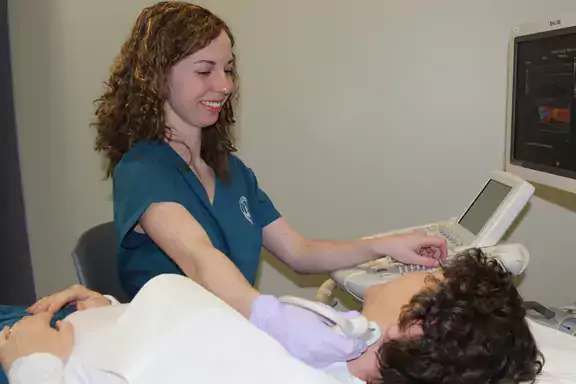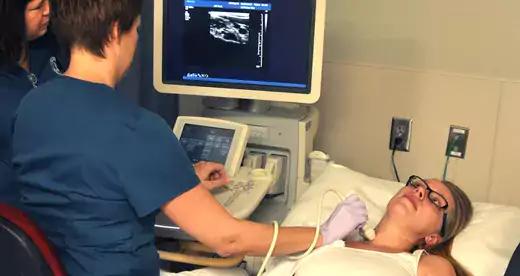The Cardiovascular Sonography curriculum provides the individual with the knowledge and skills necessary to acquire, process, and evaluate the human heart and vascular structures. A cardiovascular sonographer uses high-frequency sound waves to produce images of the heart and vascular structures.
Course work includes effective communication and patient care skills combined with a knowledge of physics, human anatomy, physiology, and pathology, all of which are essential to obtaining high-quality sonographic images.
Cardiac sonographers, also known as echocardiographers, are health care professionals trained to use imaging technology to assist the physician in identifying heart problems.
Heart disease is the leading cause of death in the nation. As the elderly population continues to expand cardiac sonographers will be vital to the diagnosis and treatment of heart disease. The U.S. Bureau of Labor Statistics predicts employment for cardiovascular sonographers to be faster than average over the next ten years.
Are you interested in technology, the heart, saving lives, and a career earning a great living? Explore our cardiovascular sonography associate degree program to learn more about the curriculum and application requirements.
Programs
| Title | Credential | Credit Hours | Link to program details |
|---|---|---|---|
| Cardiovascular Sonography A.A.S. | Degree | 75 | |
Career Opportunities
Graduates may find employment in hospitals, physicians’ offices, mobile services, and educational institutions.
Good to Know
- Observe and participate in all demonstrations and experiments in the sciences related to sonography, including group and self-learning situations.
- Learn to analyze, synthesize, solve problems, and reach an evaluative judgment.
- Have sufficient use of the senses of vision, hearing, and touch necessary to directly perform a sonographic examination, review, and evaluate the dynamic images for the purpose of identifying normal and abnormal conditions.
- Establish a sensitive, professional, and effective relationship with patients and be able to communicate verbally in an effective manner to direct patients during sonographic examinations.
- Provide physical and emotional support to patients during sonographic procedures, being able to respond to situations requiring first aid, and provide appropriate emergency care to the patient in the absence of, or until further support arrives.
- Acknowledge and understand limitations in their knowledge, skills, and abilities and to seek appropriate assistance with the identified limitations.
- Possess the ability to work collaboratively with all other healthcare professionals.
- Learn and perform routine sonographic procedures, using the intellectual capacity to manipulate the handheld camera according to the individual patient's needs and body habitus and the requirements of the procedure's standards of speed and accuracy.
- Have sufficient strength, motor coordination, and manual dexterity to transport, move, lift, and transfer patients from a wheelchair or cart to an examination table or to a patient bed. There is a sufficient amount of hand-eye coordination in an effort to manipulate the camera to obtain the appropriate image.
- Learn to respond professionally with precise, quick, and appropriate action in stressful and emergency situations.
- Accept criticism and adopt appropriate modifications in behavior based on constructive criticism.
- Possess the perseverance, diligence, and consistency to complete the sonography program curriculum.
The following facilities are used for directed clinical experience. Students will rotate through the clinical affiliates for four to five-week rotations. Some of these clinical sites may require an hour's drive from campus.
- Memorial Mission Hospital, Asheville, NC
- Blue Ridge Regional Hospital, Spruce Pine, NC
- Charles George VA Medical Center, Asheville, NC
- Margaret R. Pardee Medical Center and Radiology Outpatient Center, Hendersonville, NC
- Advent Hospital, Fletcher, NC
- Transylvania Community Hospital, Brevard, NC
- Mission Vascular Imaging, Asheville, NC
- Asheville Cardiology Associates, Asheville, NC
- Spartanburg Regional Healthcare System, Spartanburg, SC
- McDowell Hospital, Marion, NC
- Rutherford Hospital, Rutherfordton, NC
- Sonography Services / Sonocare, Morganton, NC
- Cleveland Hospital/ Atrium Health, Shelby, NC
- Harris Regional Hospital, Sylva, N
Cardiovascular Sonography students will be required to complete clinical rotations which may require them to travel as much as one hour from campus. Clinical affiliates are currently located in Asheville, Brevard, Hendersonville, Sylva, Shelby, and Upstate South Carolina. All medical sonography students will complete at least one four-week rotation during the late afternoon and early evening hours (3:30 p.m. - 10 p.m.) at some time during their clinic education. The College refund policy applies if a student drops the program after being denied clinical site privileges
Chastity Case, MA, RT(R), RDMS, RVT - Chair, Cardiovascular Sonography
- Phone: (828) 398-7470
- Email: chastitylcase@abtech.edu
Kelli Harrell, RCS, RVT
- Phone: (828) 398-7521
- Email: kellinharrell@abtech.edu
Full-Time Commitment:
Involvement in the program requires a full-time commitment. Keep in mind that there will be many demands on your time. Working too many hours and excessive outside commitments take their toll quickly on sonography students.
Impact on others:
The significant others in your life must understand and accept the extent of your involvement in studies and class and clinical attendance. This may mean less time for recreation and other activities. However, the two years will go by very quickly.
Costs:
While an associate degree is not very expensive, there are other costs in addition to tuition and fees such as textbooks, clinical uniforms, transportation, and other supply costs. Consult with the A-B Tech financial aid office for assistance if necessary. There are also many scholarship opportunities through the Foundation Office.
Program Challenges:
Sonography can be difficult to learn, and there is an immense amount to learn. The volume of information that must be learned and retained is considerable. If you meet the prerequisites for admission to the program, there is no academic reason you should not succeed. The determining factors in your success will be your commitment to studying and practicing initiative, motivation, and management of your time and personal matters.
Study Habits:
This program is challenging. Old study habits may not work. You will probably find there is so much to learn and remember from one semester to the next that your study habits will need to be modified. This is especially true because of the technical material you need to remember compared to other general education-type courses. However, if you have been a committed and successful college student in the past, you should be able to succeed in this program.
Teaching/Learning Methods:
The program uses several different teaching methods to assist you in learning. Classroom presentations, lab practice, online assignments, workbooks, audio-visuals, and written assignments are all part of your learning experience. By committing time and effort, you will be able to master the art and science of learning medical sonography.
Clinical:
Clinical education is the most important component of learning medical sonography. This involves many hours per week at the clinical sites performing sonography as a learner. Clinical education is fascinating, exciting, challenging, and very hard physical and mental work.
Lifelong Learning:
A career in sonography requires a commitment to lifelong learning. The profession changes constantly, which is also a part of what makes it so interesting. Keep in mind that continuing education is mandatory for renewing your professional credentials.
Employment:
Remember you are entering a profession that is committed to patient care twenty-four hours a day, every day. In all likelihood, your first job will involve either evenings or late night hours, weekends, and calls. New graduates are usually the ones who will be covering the holidays. Health care does not close for the holidays.
Attention to Detail:
Attention to minute detail and concentration is critical in sonography because you will be producing sonographic images that are used in medical diagnosis or treatment. A sloppy, “that’s close enough” mentality is not suited for this profession.

